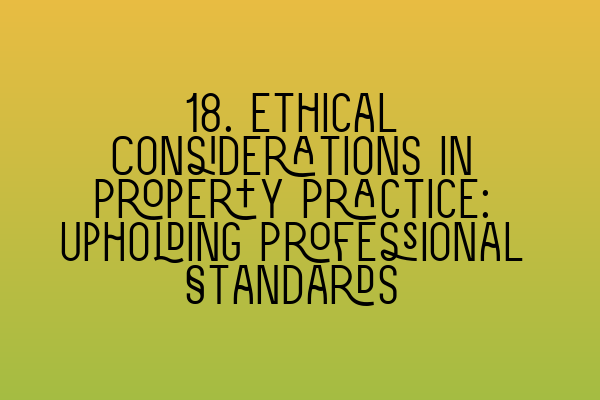Ethical Considerations in Property Practice: Upholding Professional Standards
When it comes to practicing property law, upholding professional standards and maintaining ethical considerations is paramount. Property transactions can have significant financial implications for individuals and businesses alike, making it essential for property lawyers to act diligently and ethically in their practice. In this article, we will explore some key ethical considerations that property lawyers must keep in mind to ensure the highest professional standards.
1. Confidentiality and Privacy
Confidentiality is a cornerstone of the legal profession and holds particular importance in property transactions. As a property lawyer, it is crucial to maintain the utmost confidentiality regarding your clients’ personal and financial information. This includes safeguarding their data, protecting sensitive documents, and refraining from discussing or disclosing any confidential details without the client’s consent.
Additionally, respecting your clients’ privacy is equally important. This means exercising discretion and refraining from sharing any information or details about the property transaction unless authorized by your clients.
To further ensure confidentiality and privacy, it is advisable to implement robust data protection measures and adhere to relevant legislation, such as the General Data Protection Regulation (GDPR).
2. Conflict of Interest
Avoiding conflicts of interest is essential to maintain professional standards in property practice. As a property lawyer, it is crucial to act in the best interests of your clients and avoid any situation that may compromise your impartiality or ability to provide unbiased advice. This includes refraining from representing multiple parties with competing interests in the same transaction, unless you have obtained informed consent from all parties involved.
If a conflict of interest arises, it is your duty to disclose it to your clients and take appropriate steps to manage or mitigate the conflict. This may involve withdrawing from the representation or seeking independent legal advice for the affected parties.
By diligently identifying and addressing conflicts of interest, you can ensure that your clients’ interests are protected and maintain the integrity of the profession.
3. Financial Integrity
Property transactions often involve significant sums of money, making financial integrity a critical ethical consideration in property practice. As a property lawyer, you have a duty to handle your clients’ funds with the utmost care and honesty.
Ensure that you have appropriate systems and processes in place to manage and account for client money, including complying with the Solicitors Regulation Authority (SRA) Accounts Rules. Regularly reconcile client accounts, maintain accurate records, and promptly report any discrepancies or irregularities to the relevant authorities.
It is also essential to refrain from any financial impropriety, such as commingling client funds with office accounts or using client money for personal expenses. Upholding financial integrity not only protects your clients’ interests but also maintains the reputation and credibility of the legal profession.
4. Client Communication and Transparency
Effective communication with your clients is key to upholding professional standards in property practice. It is essential to establish clear and open lines of communication, keeping your clients informed at every stage of the transaction. Regularly update your clients on the progress, provide timely advice, and promptly respond to their queries and concerns.
Transparency is also crucial in maintaining ethical standards. Clearly explain your fee structure, including any additional costs and disbursements, and ensure that your clients understand the financial implications of the transaction. Avoid any conflicts of interest that may compromise transparency or prevent you from providing accurate and unbiased advice.
By prioritizing client communication and transparency, you can foster trust and ensure that your clients are well-informed throughout the property transaction process.
5. Continuing Professional Development
As a property lawyer, it is essential to stay updated with the latest legal developments, regulations, and best practices. Continuing professional development (CPD) plays a vital role in maintaining your competence and upholding professional standards.
Engage in regular CPD activities, such as attending seminars, webinars, and training courses, to enhance your knowledge and skills in property law. Stay abreast of any changes in legislation, case law, or regulatory requirements that may impact your practice.
By investing in your professional development, you ensure that you provide the highest level of service to your clients and maintain the integrity of property practice.
Conclusion
Upholding professional standards and adhering to ethical considerations is essential in property practice. By maintaining confidentiality, avoiding conflicts of interest, upholding financial integrity, prioritizing client communication and transparency, and engaging in continuing professional development, property lawyers can ensure the highest standards of professionalism in their practice.
If you are preparing for the SQE 1 or SQE 2 exams and would like to test your knowledge, check out our related articles:
SQE 1 Practice Exam Questions
SQE 1 Practice Mocks FLK1 FLK2
SQE 2 Preparation Courses
SQE 1 Preparation Courses
SRA SQE Exam Dates.
